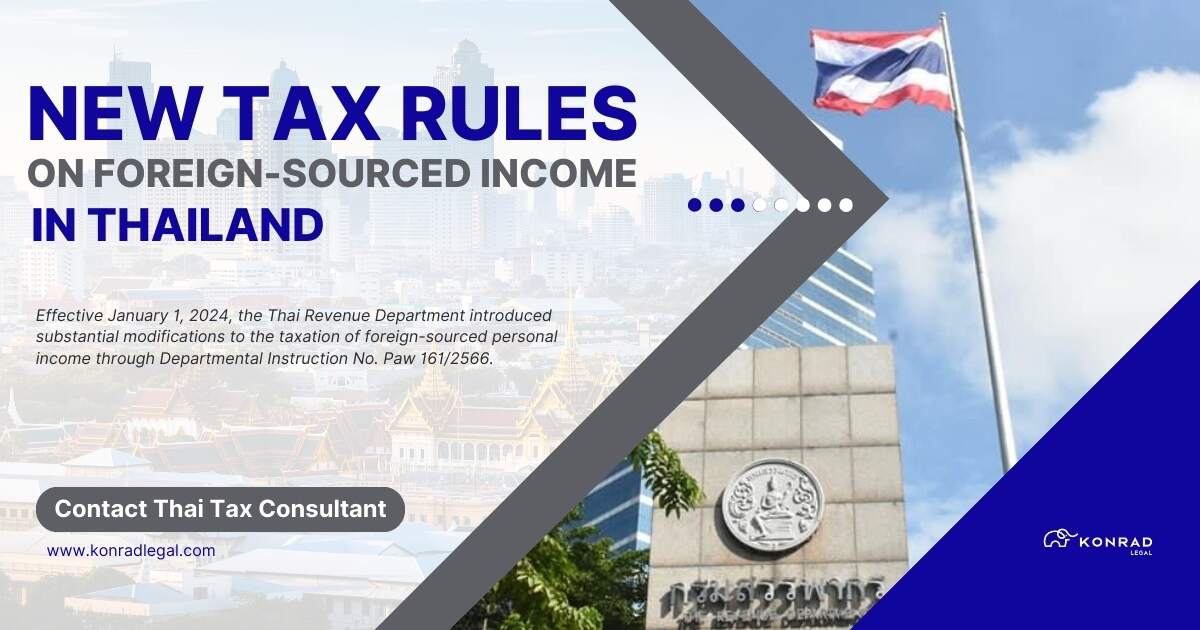Is foreign-sourced income getting credited to your Thai bank Account? Then you need to check whether it is taxable or not. Effective January 1, 2024, the Revenue Department of Thailand has implemented substantial revisions to the taxation of income derived abroad and imported into the country. These tax adjustments hold noteworthy consequences for individuals residing in Thailand. Read this article as it will help you reassess your tax on foreign income in Thailand.
Declaration of foreign-sourced income for Taxation
The Revenue Department’s recent directive, Notification 161/2566, specifically targets individual taxpayers who spend at least 180 days in Thailand during a calendar year (tax year). If you meet this criterion and bring foreign income into Thailand, you must declare it for taxation purposes. Whether the foreign income was earned in the same tax year or a different one, it’s considered income subject to taxation when brought into the country.
This new criterion replaces the previous directive, No. 0802/696, on May 1, 1987, which exempted foreign income brought into Thailand from being re-declared.
Sources of income that will be taxable
As per the newly implemented taxation regulation, income generated from sources outside Thailand is subject to taxation. This includes earnings from duties performed overseas, businesses operating abroad, or assets held outside the country.
Specific examples of such income sources include wages earned from work performed in foreign countries, profits obtained from the sale of assets overseas, dividends received from foreign stocks, interest earned from foreign sources, and royalties originating from abroad.
Order of Revenue Department of Thailand
On November 20, 2023, the Thai Tax Authority clarified the provisions of Revenue Department Order No. 161/2566. Specifically, Revenue Department Order No. 162/2566 states that the changes made by Order 161/2566 do not apply to income received before January 1, 2024. In other words, the pre-existing rules continue to apply to income earned before this date.
Effective from January 1, 2024, this order governs foreign-source income assessment at the domicile of the income earner. The change applies starting from the 2024 tax year onwards. The previous principle continues to apply to income earned from foreign sources before the 2024 tax year. According to the Revenue Code, such income must be repatriated to Thailand in the same tax year it is earned. Furthermore, individuals are not liable for personal income tax on this income.
From January 1, 2024, individuals will be liable to pay tax on income earned before 2024. They should be able to demonstrate that it was transferred to Thailand after the effective date. This modification results from a new clarification regarding the taxation of foreign income.
Relief for Tax Treaties
The significance of tax treaties established between Thailand and other nations must be considered. These treaties may provide exemptions or reduced tax rates applicable to foreign income. Businesses and individuals should thoroughly examine the relevance of such treaties within the context of their unique circumstances.
Key Considerations for Foreign Businesses
In light of the newly implemented tax regulations, businesses need to take into account the following critical considerations:
- Increased compliance burden: To comply with tax regulations, businesses must maintain accurate records and prepare thorough tax reports for employees earning income overseas upon their transfer to Thailand.
- Tax implications for expats: Individuals living in Thailand for over 180 days must take notice of this recently enacted regulation and incorporate it into their financial plans accordingly.
- Review global mobility programs: In light of the recent changes in Thailand’s tax laws regarding foreign income, companies with global mobility programs that include tax equalization for assignees should consider revising their policies accordingly.
The Bottom line
Thailand’s new taxation criteria for foreign-sourced income bring about a significant change for individuals residing in the country for more than 180 days a year. Previously exempt, foreign income brought into Thailand is now subject to taxation regardless of the timing of its acquisition. This development necessitates diligent tax planning and meticulous bookkeeping for foreign individuals and businesses in Thailand.
This change may impose additional compliance burdens. However, it is crucial to consider that tax treaties with other countries may offer exemptions or reduced tax rates. It is advisable for businesses with employees earning income abroad and for expatriates living in Thailand to explore these possibilities to mitigate their tax liabilities. Companies with global mobility programs may also need to review and adjust their policies in light of the new tax treatment.
To assess and pay tax on your foreign income in Thailand, seek guidance from a qualified Thai tax advisor. Please email us at officer@konradlegal.com to connect with our team of qualified Thai Corporate and Personal Tax Accountants in Thailand.



